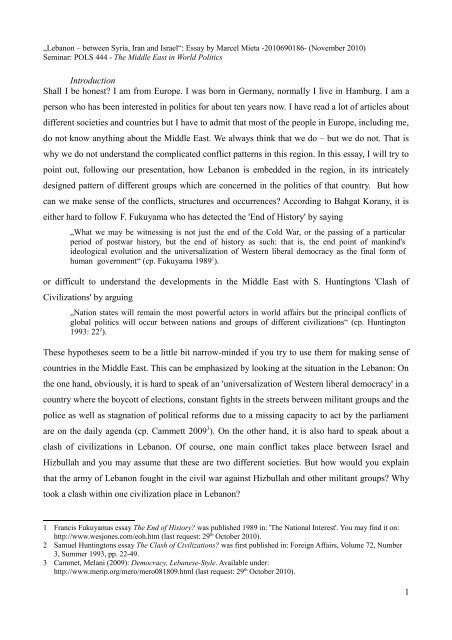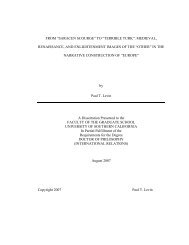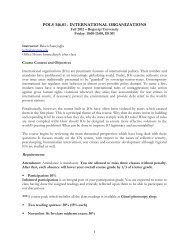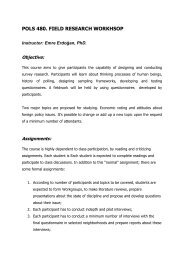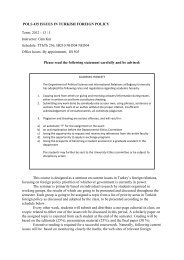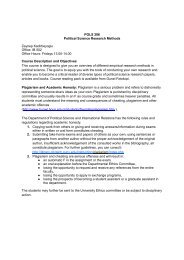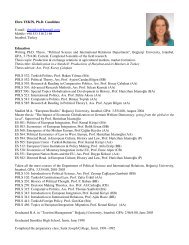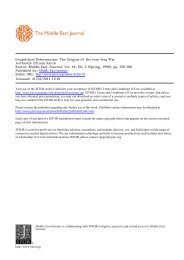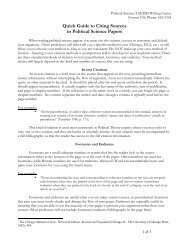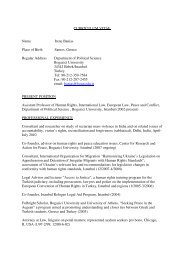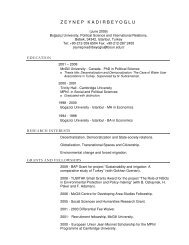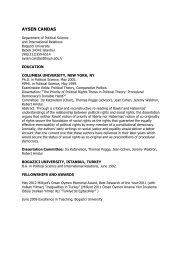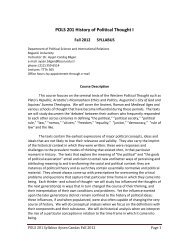Introduction Shall I be honest? I am from Europe. I was born in ...
Introduction Shall I be honest? I am from Europe. I was born in ...
Introduction Shall I be honest? I am from Europe. I was born in ...
Create successful ePaper yourself
Turn your PDF publications into a flip-book with our unique Google optimized e-Paper software.
„Lebanon – <strong>be</strong>tween Syria, Iran and Israel“: Essay by Marcel Mieta -2010690186- (Novem<strong>be</strong>r 2010)<br />
Sem<strong>in</strong>ar: POLS 444 - The Middle East <strong>in</strong> World Politics<br />
<strong>Introduction</strong><br />
<strong>Shall</strong> I <strong>be</strong> <strong>honest</strong>? I <strong>am</strong> <strong>from</strong> <strong>Europe</strong>. I <strong>was</strong> <strong>born</strong> <strong>in</strong> Germany, normally I live <strong>in</strong> H<strong>am</strong>burg. I <strong>am</strong> a<br />
person who has <strong>be</strong>en <strong>in</strong>terested <strong>in</strong> politics for about ten years now. I have read a lot of articles about<br />
different societies and countries but I have to admit that most of the people <strong>in</strong> <strong>Europe</strong>, <strong>in</strong>clud<strong>in</strong>g me,<br />
do not know anyth<strong>in</strong>g about the Middle East. We always th<strong>in</strong>k that we do – but we do not. That is<br />
why we do not understand the complicated conflict patterns <strong>in</strong> this region. In this essay, I will try to<br />
po<strong>in</strong>t out, follow<strong>in</strong>g our presentation, how Lebanon is em<strong>be</strong>dded <strong>in</strong> the region, <strong>in</strong> its <strong>in</strong>tricately<br />
designed pattern of different groups which are concerned <strong>in</strong> the politics of that country. But how<br />
can we make sense of the conflicts, structures and occurrences? Accord<strong>in</strong>g to Bahgat Korany, it is<br />
either hard to follow F. Fukuy<strong>am</strong>a who has detected the 'End of History' by say<strong>in</strong>g<br />
„What we may <strong>be</strong> witness<strong>in</strong>g is not just the end of the Cold War, or the pass<strong>in</strong>g of a particular<br />
period of postwar history, but the end of history as such: that is, the end po<strong>in</strong>t of mank<strong>in</strong>d's<br />
ideological evolution and the universalization of Western li<strong>be</strong>ral democracy as the f<strong>in</strong>al form of<br />
human government“ (cp. Fukuy<strong>am</strong>a 1989 1 ).<br />
or difficult to understand the developments <strong>in</strong> the Middle East with S. Hunt<strong>in</strong>gtons 'Clash of<br />
Civilizations' by argu<strong>in</strong>g<br />
„Nation states will rema<strong>in</strong> the most powerful actors <strong>in</strong> world affairs but the pr<strong>in</strong>cipal conflicts of<br />
global politics will occur <strong>be</strong>tween nations and groups of different civilizations“ (cp. Hunt<strong>in</strong>gton<br />
1993: 22 2 ).<br />
These hypotheses seem to <strong>be</strong> a little bit narrow-m<strong>in</strong>ded if you try to use them for mak<strong>in</strong>g sense of<br />
countries <strong>in</strong> the Middle East. This can <strong>be</strong> emphasized by look<strong>in</strong>g at the situation <strong>in</strong> the Lebanon: On<br />
the one hand, obviously, it is hard to speak of an 'universalization of Western li<strong>be</strong>ral democracy' <strong>in</strong> a<br />
country where the boycott of elections, constant fights <strong>in</strong> the streets <strong>be</strong>tween militant groups and the<br />
police as well as stagnation of political reforms due to a miss<strong>in</strong>g capacity to act by the parli<strong>am</strong>ent<br />
are on the daily agenda (cp. C<strong>am</strong>mett 2009 3 ). On the other hand, it is also hard to speak about a<br />
clash of civilizations <strong>in</strong> Lebanon. Of course, one ma<strong>in</strong> conflict takes place <strong>be</strong>tween Israel and<br />
Hizbullah and you may assume that these are two different societies. But how would you expla<strong>in</strong><br />
that the army of Lebanon fought <strong>in</strong> the civil war aga<strong>in</strong>st Hizbullah and other militant groups? Why<br />
took a clash with<strong>in</strong> one civilization place <strong>in</strong> Lebanon?<br />
1 Francis Fukuy<strong>am</strong>as essay The End of History? <strong>was</strong> published 1989 <strong>in</strong>: 'The National Interest'. You may f<strong>in</strong>d it on:<br />
http://www.wesjones.com/eoh.htm (last request: 29 th Octo<strong>be</strong>r 2010).<br />
2 S<strong>am</strong>uel Hunt<strong>in</strong>gtons essay The Clash of Civilizations? <strong>was</strong> first published <strong>in</strong>: Foreign Affairs, Volume 72, Num<strong>be</strong>r<br />
3, Summer 1993, pp. 22-49.<br />
3 C<strong>am</strong>met, Melani (2009): Democracy, Lebanese-Style. Available under:<br />
http://www.merip.org/mero/mero081809.html (last request: 29 th Octo<strong>be</strong>r 2010).<br />
1
„Lebanon – <strong>be</strong>tween Syria, Iran and Israel“: Essay by Marcel Mieta -2010690186- (Novem<strong>be</strong>r 2010)<br />
Sem<strong>in</strong>ar: POLS 444 - The Middle East <strong>in</strong> World Politics<br />
Theoretical Background<br />
Especially Lebanon can <strong>be</strong> outl<strong>in</strong>ed as a diversified country. This is why I try to follow Bahgat<br />
Korany with his concept of <strong>in</strong>termestics (cp. Korany 2009: 63f. 4 ). Accord<strong>in</strong>g to Korany, the <strong>be</strong>st<br />
conceptual lens <strong>in</strong> research<strong>in</strong>g the Middle East is the focus on the <strong>in</strong>ternational and the domestic<br />
context <strong>in</strong> a country and – most importantly – its <strong>in</strong>terdependence. After a short <strong>in</strong>troduction on the<br />
disunion <strong>in</strong> Lebanon, I will try to emphasize the relations to three other countries: Syria, Iran and<br />
Israel. They had and still have a big <strong>in</strong>fluence on the structures and events on the domestic level <strong>in</strong><br />
Lebanon which stresses this relation. Take for <strong>in</strong>stance the civil war <strong>in</strong> the 1970s and 1980s, the<br />
foundation of Hizbullah or the 2006-war <strong>be</strong>tween Israel and Lebanon. As I have already mentioned<br />
above, it is important to ex<strong>am</strong><strong>in</strong>e the connection <strong>be</strong>tween the <strong>in</strong>ternational <strong>in</strong>fluence on Lebanon<br />
and the domestic occurences <strong>be</strong>cause '[i]n the globalization era, MENA's [Middle East and<br />
Northern Africa] <strong>in</strong>ternational relations can no longer <strong>be</strong> separated <strong>from</strong> regime type and the<br />
society's good governance.“ (Korany 2009 5 ). In my conclusion, I will highlight the importance of<br />
the Arab-Israeli conflict for Lebanon. Peace will not occur as long this conflict shapes the ideas<br />
<strong>be</strong>tween the Arab and the Israeli world.<br />
Disunion of Lebanon as a base for all further developments<br />
Lebanon <strong>was</strong> one out of many countries where the imperial forces of France and Great Britian had a<br />
big <strong>in</strong>terest <strong>in</strong> the aftermath of the First World War. The former land of the Ottoman Empire had<br />
<strong>be</strong>en divided and many new states emerged (cp. Rogan 2009 6 ). Lebanon <strong>was</strong> highly <strong>in</strong>fluenced by<br />
France which had <strong>be</strong>en try<strong>in</strong>g to build up a Christian state <strong>in</strong> the region <strong>in</strong> competition to the<br />
emergence of a Jewish state <strong>in</strong> Palest<strong>in</strong>e. This is, I guess, one of the most important basics<br />
everybody has to <strong>be</strong>ar <strong>in</strong> m<strong>in</strong>d <strong>in</strong> order to understand any recent development <strong>in</strong> Lebanon.<br />
Moreover, it is part of the MENA-countries, thus, the <strong>in</strong>fluence by many Isl<strong>am</strong>ic groups <strong>in</strong> this<br />
country is very important. Follow<strong>in</strong>g the <strong>in</strong>dependence after World War II, a very special political<br />
order emerged <strong>in</strong> Lebanon based on the ethno-religious groups <strong>in</strong> this country (the two biggest<br />
groups where the Christians and the Muslims divided <strong>in</strong> many subgroups). For a period of about 20<br />
years, the country can <strong>be</strong> characterized as very stable towards its neighbours. But with the<br />
upcom<strong>in</strong>g of the PLO <strong>in</strong> Lebanon, it has <strong>be</strong>come a part of the Arab-Israeli conflict <strong>in</strong> general and<br />
4 Korany, Bahgat (2009): The Middle East S<strong>in</strong>ce the Cold War: Still Insecure, <strong>in</strong>: Fawcett, Louise (ed.): International<br />
Relations of the Middle East, Oxford University Press, pp. 61-78.<br />
5 ibd.: 77.<br />
6 Rogan, Eugene L. (2009): The Emergence of the Middle East <strong>in</strong>to the Modern State System, <strong>in</strong>: Fawcett, Louise<br />
(ed.): International Relations of the Middle East, Oxford University Press, pp. 21-43.<br />
2
„Lebanon – <strong>be</strong>tween Syria, Iran and Israel“: Essay by Marcel Mieta -2010690186- (Novem<strong>be</strong>r 2010)<br />
Sem<strong>in</strong>ar: POLS 444 - The Middle East <strong>in</strong> World Politics<br />
the Israeli-Palest<strong>in</strong>ian conflicht <strong>in</strong> particular. Related to that, the foundation of Hizbullah can <strong>be</strong><br />
marked as a turn<strong>in</strong>g po<strong>in</strong>t <strong>in</strong> the history of Lebanon. It <strong>was</strong> stricken with a violent civil war which<br />
had <strong>be</strong>en occurr<strong>in</strong>g <strong>be</strong>tween 1975 and 1990. The Taif Agreement tried to solve this conflict by<br />
separat<strong>in</strong>g Lebanon more and more <strong>be</strong>tween the different gourps but until today we can not f<strong>in</strong>d<br />
stable structures. I will, furthermore, try to emphasize the developments <strong>in</strong> this country by means of<br />
its relations to three important actors <strong>in</strong> the Arab-Israeli conflict: Syria, Iran and Israel.<br />
Relations to Syria, Iran and Israel<br />
Lebanon has <strong>be</strong>en f<strong>in</strong>d<strong>in</strong>g itself <strong>in</strong> a very complicated situation for about 30 years now. In the last<br />
paragraph, I have mentioned the foundation of Hizbullah as the turn<strong>in</strong>g po<strong>in</strong>t <strong>in</strong> the history of the<br />
country. This non-state actor can <strong>be</strong> called as a good exemple for the <strong>in</strong>troduced theoretical<br />
fr<strong>am</strong>ework. As a domestic actor, Hizbullah has <strong>be</strong>en <strong>in</strong>fluenc<strong>in</strong>g Lebanese politics s<strong>in</strong>ce its<br />
foundation to a high extent. But this actor could not exist without its close relations to Syria and<br />
Iran, exploit<strong>in</strong>g Hizbullah for their hostility towards Israel. Hence, we may f<strong>in</strong>d an <strong>in</strong>teraction<br />
<strong>be</strong>tween the <strong>in</strong>ternational and domestic level. But how may these certa<strong>in</strong> connections <strong>be</strong> further<br />
characterised?<br />
The resistance towards the <strong>in</strong>vasion of Israel <strong>in</strong> 1982 can <strong>be</strong> detected as a reason for the foundation<br />
of the militant, by many western scholars called „terrorist“, organization (cp. Davis 2007: 30 7 ). This<br />
„raison d'être“, as Davis puts it, has never changed s<strong>in</strong>ce then. However, the self-image by<br />
Hizbullah has changed more and more <strong>in</strong> the past years. I will return to that later <strong>in</strong> my conclusion<br />
<strong>be</strong>cause this is a very crucial po<strong>in</strong>t for the further developments <strong>in</strong> Lebanon. Syria and Iran backed<br />
the foundation of Hizbullah with f<strong>in</strong>ancial aids but it is important to mention that both countries had<br />
– <strong>be</strong>sides the enmity towards Israel – other claims <strong>in</strong> Lebanon which made the situation even far<br />
more complicated. Due to the common history, Syria has had a special relation towards Lebanon,<br />
consequently, they had never acknowledged Lebanon as a sovereign country until 2008/2009. In<br />
this context, I have to highlight the assass<strong>in</strong>ation of the former prime m<strong>in</strong>ister Rafiq al-Harari <strong>in</strong><br />
2005. Syria <strong>was</strong> suspected that they took part <strong>in</strong> the assass<strong>in</strong>ation. Follow<strong>in</strong>g this events, Syria had<br />
to withdraw their troops after over 25 years <strong>from</strong> the lebanese country (cp. Smith 2010: 377 8 ). The<br />
assass<strong>in</strong>ation of al-Hariri has changed the relations <strong>be</strong>tween both countries and it is almost<br />
7 Davis, Peita (2007): Fill<strong>in</strong>g the Void: Hizbullah’s State Build<strong>in</strong>g <strong>in</strong> Lebanon, University of Sydney, Australia, pp.<br />
30-39. You may f<strong>in</strong>d this thesis on: http://ses.library.usyd.edu.au/bitstre<strong>am</strong>/2123/2163/1/Peita20Davis.pdf (last<br />
request: 3 rd Novem<strong>be</strong>r 2010).<br />
8 Smith, Charles D. (2010): Palest<strong>in</strong>e and the Arab-Israeli Conflict, Boston – New York, Bedford/St. Mart<strong>in</strong>s.<br />
3
„Lebanon – <strong>be</strong>tween Syria, Iran and Israel“: Essay by Marcel Mieta -2010690186- (Novem<strong>be</strong>r 2010)<br />
Sem<strong>in</strong>ar: POLS 444 - The Middle East <strong>in</strong> World Politics<br />
impossible to evalute the importance of this twist to the right extent. Iran, therefore, has always<br />
tried to export its „Isl<strong>am</strong>ic Revolution“ <strong>in</strong>to the other Arab countries. Thus, they started to support<br />
Shia groups (e.g. Hizbullah) <strong>in</strong> order to, first, <strong>in</strong>crease their <strong>in</strong>fluence <strong>in</strong> this country and, second,<br />
have an ally aga<strong>in</strong>st Israel.<br />
All power relations, ideologies, <strong>in</strong>terests with<strong>in</strong> Lebanon seem to rise and fall with the Arab-Israeli<br />
conflict. That is why I need to mention Israel and its relations to Lebanon to unterstand the countrys<br />
division. Israel has <strong>be</strong>en dist<strong>in</strong>guish<strong>in</strong>g oneself by fight<strong>in</strong>g aga<strong>in</strong>st the terrorist forces <strong>in</strong> South<br />
Lebanon who have <strong>be</strong>en a remarkable threat to Israeli civilians. After the World War II, Israel and<br />
Lebanon were not very hostile towards each other. After the PLO had withdrawn <strong>from</strong> Lebanon,<br />
Hizbullah took their place to threat Israel. S<strong>in</strong>ce then, the relations <strong>be</strong>tween Lebanon and Israel<br />
have <strong>be</strong>en determ<strong>in</strong>ed by the role of Hizbullah. Most remarkably were the two wars <strong>be</strong>tween the<br />
countries <strong>in</strong> the <strong>be</strong>g<strong>in</strong>n<strong>in</strong>g of the 1980s and <strong>in</strong> 2006. I want to ex<strong>am</strong><strong>in</strong>e the second one a little bit<br />
more <strong>in</strong> detail <strong>in</strong> the follow<strong>in</strong>g paragraph <strong>be</strong>cause it shows that the Arab-Israeli conflict is far <strong>from</strong><br />
<strong>be</strong><strong>in</strong>g solved <strong>in</strong> the 21 st century and, furthermore, it discloses that Israel even starts a war aga<strong>in</strong>st<br />
another country <strong>in</strong> order to release two hostages. But this <strong>was</strong> only the official reason.<br />
Actually, it is not sure whether the war <strong>in</strong> 2006 <strong>be</strong>tween Lebanon and Israel started <strong>be</strong>cause two<br />
soldiers were kidnapped by Hizbullah (cp. Alagha 2008: 2f. 9 ). Alagha argues that Israel might had<br />
prepared an attack and they were just look<strong>in</strong>g for a reason to start it. Whether this is true or not, is<br />
not part of my discussion. Important to state at this po<strong>in</strong>t is the potential threat by southern lebanese<br />
militant groups for the people <strong>in</strong> northern Israel. The sangu<strong>in</strong>ary war <strong>be</strong>tween Lebanon and Israel<br />
lasted 34 days until the UN tried to solve the problem with the UN-Resolution 1701 <strong>in</strong>clud<strong>in</strong>g the<br />
disarm<strong>am</strong>ent of Hizbullah (cp. Eden-Fleig 2007: 6 10 ). Although, Israeli troops withdrew <strong>from</strong><br />
Lebanon, the tensions have never stopped <strong>in</strong> this area. In August 2010 fights took place at the<br />
boarder <strong>be</strong>tween the two countries and 4 people were killed (cp. Spiegel 2010 11 ), the Iranian<br />
President Mahmoud Ahmad<strong>in</strong>edjad visited Lebanon <strong>in</strong> Octo<strong>be</strong>r 2010 which <strong>was</strong> a clearly offense<br />
towards Israel. These recent developments, and I picked out just a few (even not mention<strong>in</strong>g the<br />
importance of the „UN al-Hariri-Tribunal“ and its effects on the lebanese domestic peace), show<br />
9 Alagha, Joseph (2007): The Israeli – Hizbullah 34-Day War: Causes and Consequences, <strong>in</strong>: Arab Studies Quarterly,<br />
Volume 30, num<strong>be</strong>r 2, Spr<strong>in</strong>g 2008. You may f<strong>in</strong>d this article on: http://www.thefreelibrary.com/The+Israeli-<br />
Hizbullah+34-day+war%3A+causes+and+consequences-a0185487490 (last request: 3 rd Novem<strong>be</strong>r 2010).<br />
10 Eden-Fleig, Wiebke (2007): Libanon: Politische Krise ohne ende, <strong>in</strong>: German Institute of Global and Area Studies,<br />
Nummer 8. This article can <strong>be</strong> found on: http://www.giga-h<strong>am</strong>burg.de/dl/download.php?<br />
d=/content/publikationen/pdf/gf_nahost_0708.pdf (last request on: 6 th Novem<strong>be</strong>r 2010).<br />
11 Compare this article about recent fights at the Southern Lebanese boarder:<br />
http://www.spiegel.de/politik/ausland/0,1518,709908,00.html (last request on: 3 rd Novem<strong>be</strong>r 2010).<br />
4
„Lebanon – <strong>be</strong>tween Syria, Iran and Israel“: Essay by Marcel Mieta -2010690186- (Novem<strong>be</strong>r 2010)<br />
Sem<strong>in</strong>ar: POLS 444 - The Middle East <strong>in</strong> World Politics<br />
that this country is far away <strong>from</strong> <strong>be</strong><strong>in</strong>g a stable democracy, free of constant exertion of <strong>in</strong>fluences<br />
on the stability of the state.<br />
Conclusion<br />
Due to efforts to create an imperial base as a response to the <strong>in</strong>volvement of Great Brita<strong>in</strong> <strong>in</strong><br />
Palest<strong>in</strong>e, Lebanon has <strong>be</strong>come a highly diversified country with many different ethno – religious<br />
groups. In the past 60 years this division has <strong>be</strong>en more and more <strong>in</strong>stitutionalized <strong>in</strong> a special<br />
political system. Because of this particular feature, Lebanon <strong>was</strong> likely to <strong>be</strong>come a playground for<br />
many <strong>in</strong>terest groups and states. Syria's and Iran's <strong>in</strong>tentions have <strong>be</strong>en, therefore, opposed to the<br />
Israel's position to a great extent.<br />
It has to <strong>be</strong> stated that the country can not <strong>be</strong> characterized as a stable and resistant democracy so<br />
far. After the end of the 2006-war <strong>be</strong>tween Israel and Lebanon, more and more domestic problems<br />
have just occurred. Hizbullah, though a militant organization for nearly 25 years, has tried to<br />
<strong>in</strong>tegrate more and more <strong>in</strong> the political system. They <strong>be</strong>c<strong>am</strong>e part of the parli<strong>am</strong>ent and have tried<br />
to <strong>in</strong>fluence domestic politics not only via suicide attacks but also via parli<strong>am</strong>entary work.<br />
Although, they have not forgotten where they come <strong>from</strong>. In Decem<strong>be</strong>r 2006, Hizbullah „took the<br />
streets <strong>in</strong> downtown Beirut (...), they demanded [for] the formation of a national unity Cab<strong>in</strong>et“<br />
(Alagha 2008: 11). Although the lebanese army has tried to control southern Lebanon more and<br />
more for four years now, the <strong>in</strong>fluence by Hizbullah has not <strong>be</strong>en decreas<strong>in</strong>g to the extent that Israel<br />
feels safe.<br />
All <strong>in</strong> all, despite the very complex structure of this country, three conflict levels will <strong>be</strong> essential<br />
for the future and peace of Lebanon: Firstly, the self-image of Hizbullah and subsequently the fights<br />
<strong>be</strong>tween Hizbullah and the government as well as the implementation of the UN – Resolution 1701.<br />
Will Hizbullah <strong>in</strong>tegrate <strong>in</strong> the political system and will they try to transform <strong>in</strong>to a state-actor or<br />
will they keep their militant character? In fact, this organisation has started to change but this<br />
<strong>in</strong>tegration is not completed yet. F<strong>in</strong>ally, how will the role of Israel, Syria, Iran and the USA<br />
develop? These questions are very hard to answer right now but what I have tried to show <strong>in</strong> my<br />
essay is the follow<strong>in</strong>g: As long as the Arab-Israeli conflict has not <strong>be</strong>en solved, it seems as a<br />
mistake to assume that the conflicts <strong>in</strong> Lebanon could <strong>be</strong> straightened out and peace could <strong>be</strong><br />
implemented <strong>in</strong> this country. With the emphasis on the <strong>in</strong>ternational and domestic context, it seems<br />
possible to understand the complex structure of such a diversified country, though it is not easy to<br />
f<strong>in</strong>d a start<strong>in</strong>g po<strong>in</strong>t.<br />
5
„Lebanon – <strong>be</strong>tween Syria, Iran and Israel“: Essay by Marcel Mieta -2010690186- (Novem<strong>be</strong>r 2010)<br />
Sem<strong>in</strong>ar: POLS 444 - The Middle East <strong>in</strong> World Politics<br />
Bibliography<br />
Alagha, Joseph (2007): The Israeli – Hizbullah 34-Day War: Causes and Consequences, <strong>in</strong>:<br />
Arab Studies Quarterly, Volume 30, num<strong>be</strong>r 2, Spr<strong>in</strong>g 2008. Available under:<br />
http://www.thefreelibrary.com/The+Israeli-Hizbullah+34-day+war<br />
%3A+causes+and+consequences-a0185487490 (last request: 3 rd Novem<strong>be</strong>r 2010).<br />
C<strong>am</strong>met, Melani (2009): Democracy, Lebanese-Style. Available under:<br />
http://www.merip.org/mero mero081809.html (last request: 29 th Octo<strong>be</strong>r 2010).<br />
Eden-Fleig, Wiebke (2007): Libanon: Politische Krise ohne Ende, <strong>in</strong>: German Institute of<br />
Global and Area Studies, Nummer 8. This article can <strong>be</strong> found on: http://www.gigah<strong>am</strong>burg.de/dl/download.php?d=/content/publikationen/pdf/gf_nahost_0708.pdf<br />
(last request on: 6 th<br />
Novem<strong>be</strong>r 2010).<br />
Fukuy<strong>am</strong>a, Francis (1989): The End of History?, <strong>in</strong>: The National Interest. Available under:<br />
http://www.wesjones.com/eoh.htm (last request: 29 th Octo<strong>be</strong>r 2010).<br />
Hunt<strong>in</strong>gton, S<strong>am</strong>uel (1993): The Clash of Civilizations?, <strong>in</strong>: Foreign Affairs, Volume 72,<br />
Num<strong>be</strong>r 3, Summer 1993, pp. 22-49.<br />
Korany, Bahgat (2009): The Middle East S<strong>in</strong>ce the Cold War: Still Insecure, <strong>in</strong>: Fawcett,<br />
Louise (ed.): International Relations of the Middle East, Oxford University Press, pp. 61-78.<br />
Davis, Peita (2007): Fill<strong>in</strong>g the Void: Hizbullah’s State Build<strong>in</strong>g <strong>in</strong> Lebanon, University of<br />
Sydney, Australia, pp. 30-39. Available under: http://ses.library.usyd.edu.au/bitstre<strong>am</strong>/2123/2163/1/<br />
Peita20Davis.pdf (last request: 3 rd Novem<strong>be</strong>r 2010).<br />
Rogan, Eugene L. (2009): The Emergence of the Middle East <strong>in</strong>to the Modern State System,<br />
<strong>in</strong>: Fawcett, Louise (ed.): International Relations of the Middle East, Oxford University Press, pp.<br />
21-43.<br />
Smith, Charles D. (2010): Palest<strong>in</strong>e and the Arab-Israeli Conflict, Boston – New York,<br />
Bedford/St. Mart<strong>in</strong>s.<br />
6


